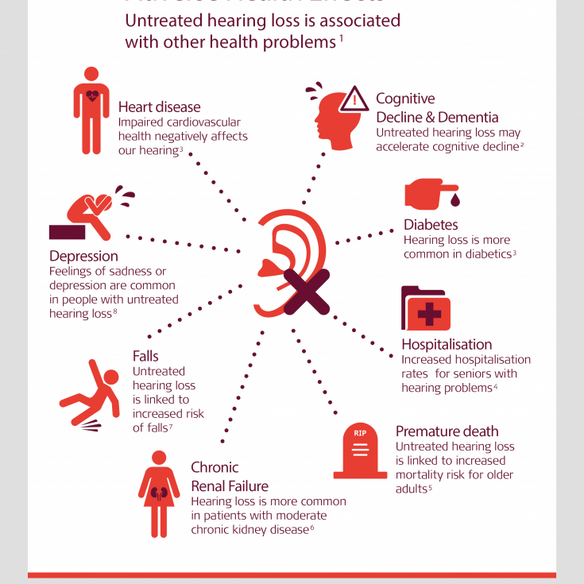
Hearing loss can have a significant impact on a person’s ability to communicate and engage with the world around them, it’s important to understand that it can also have implications for general well-being, overall health, cognition, and mental health.
Research has shown that hearing loss is linked to a range of other health issues, including cognitive decline, depression, social isolation, diabetes, hypertension, falls, and a reduced quality of life. Let’s explore some of these connections in more detail:
Cognitive Decline and Hearing Loss
Studies have found that hearing loss is a risk factor for cognitive decline and dementia. This may be because hearing loss places a greater cognitive load on the brain, making it more difficult to process and understand speech. Over time, this increased cognitive load may contribute to changes in brain structure and function that can lead to cognitive decline.
Mental Health and Hearing Loss
Hearing loss can also have an impact on mental health. Research has found that people with hearing loss are more likely to experience depression, anxiety, and other mental health issues. This may be due in part to the social isolation and communication difficulties that can accompany hearing loss.
Hearing loss can also lead to social isolation, which in turn can have negative effects on health. People with hearing loss may avoid social situations or feel excluded from conversations, which can lead to feelings of loneliness and isolation. Social isolation has been linked to a range of health issues, including depression, cognitive decline, and an increased risk of mortality.
Falls and Hearing Loss
Falls are the leading cause of fatal and non-fatal injuries among the elderly. A study at Johns Hopkins found that people with mild hearing loss were nearly three times more likely to have a history of falling. As the hearing loss increased in severity, so did the fall report. This finding still held true, even when researchers corrected for other factors linked with falling, including age, sex, race, cardiovascular disease, and vestibular function.
Hearing loss and vertigo are common symptoms among the elderly. Your hearing organ shares a space with your balance organ. Audiologist treat both hearing loss and imbalance/vertigo.
Cardiovascular Disease
Researchers reported that patients with low-frequency hearing loss should be considered “at-risk” for cardiovascular conditions. One chart in the study suggests that about 85% of diagnosed strokes were associated with individuals who had flat or low-frequency sloping losses. The results suggest that there may be a common vascular pathology within the cerebrovascular system or vascular compromise affecting both hearing and cardiovascular structures.
Blood Pressure
There is a significant association between hypertension and an increase in the hearing threshold. Studies show that people who have an increase in blood pressure have a higher rate of hearing loss. If the blood pressure stays high for a long period of time, it will permanently damage the hearing organs. Researchers found that a sudden change in hearing is a significant warning flag that should not be ignored. One study showed that persons with sudden severe hearing loss were 150 percent more likely to experience a stroke within two years of the change in hearing.
Diabetes
A recent study found that hearing loss is twice as common in people with diabetes as it is in those who don’t have the disease. The rate of hearing loss is 30 percent higher in those who have prediabetes than in those with normal blood glucose.
Quality of Life
Finally, hearing loss can have a significant impact on a person’s overall quality of life. It can affect relationships, employment, and leisure activities, and may lead to feelings of frustration, anger, or sadness. Addressing hearing loss can help improve quality of life by enabling people to better communicate and engage with the world around them.
So, what can be done to address hearing loss and its impact on health? One of the most important steps is to seek treatment for hearing loss as soon as possible. This may involve using hearing aids or other assistive devices, or working with a speech-language pathologist to develop strategies for communication.
In addition to addressing hearing loss directly, there are a number of other steps that can be taken to promote overall health and well-being. These may include regular exercise, a healthy diet, and social activities that promote connection and engagement with others.
Conclusion
In conclusion, hearing loss is a common health condition that can have a significant impact on overall health and well-being. By understanding the connections between hearing loss and other health issues, we can work to address these issues and promote a better quality of life for people with hearing loss. Whether through the use of assistive devices, social support, or other interventions, it’s important to take steps to address hearing loss and promote better health for all.

